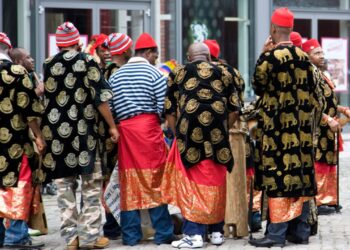In the incessant light drizzle that threatened vainly to shut down business activities at Sango Ota, Ogun State, on Tuesday morning, Toyosi Kalejaye, sat in front of her tiny shop where she sold beverages along with biscuits spread on a table to entice passing school children.
Kalejaye, a mother of two, who is separated from her husband, as our correspondent would later learn, does not have the luxury of closing up shop as a result of bad weather.
As she sat tight expecting her second customer in about seven hours since she opened her shop that day, she cut a figure of the can-do spirit of the Nigerian; the will to survive against all odds.
But for this trader, who seemed to be in her 40s, it is much more than that.
Kalejaye, like many traders like her on that street in Sango Ota, had a target to meet – one that could either lead to her disgrace, manhandling or a momentary respite from a burden that would be repeated again the next week.
She is one of the beneficiaries of a local micro-credit scheme that has gained popularity as a way in which local traders and housewives survive in many Ogun border towns like Sango Ota, Idiroko, Mowe and Ijoko.
In these communities, the fire of financial troubles is doused with the water of soft loans.
The popularity that these loan schemes have garnered in these communities can be likened to a two-edged sword.
For some traders, it has been a boost to their business, while for many, obtaining the loan is likely poking the eyes of a sleeping lion.
In fact, the trouble that many traders find themselves after obtaining the loans, is the source of the name in which the schemes have become known by residents. They liken it to putting one’s breasts on a lantern and call it ‘Gbo’mu-le-lantern’.
In the face of the lack of the necessary collaterals that would enable local traders to obtain loans from actual banks, they say it is easier to approach the unregulated micro-credit centres operating in the communities for loan.
But for many of the beneficiaries, the experience changes their views quickly afterwards.
When our correspondent spoke with some of such traders, who have at one point or another benefitted from the loans, they shared some tales of some of their unpleasant experience.
A petty trader, Mrs. Kudirat Raimi, said she benefitted from the loan scheme a couple of times before she could no longer bear seeing people who defaulted in payment being shamed publicly.
But that was not why she opted out. For her, the frightening part was what she described as the “toilet treatment.”
“You join by first registering and start going to their local meeting over a period of five weeks. In that five weeks, you make a contribution of N7,000. Out of that N7,000, your actual saving is N6,000 while N800 belongs to the scheme and N200 to the head of the scheme.
“After five weeks of going to meetings regularly and submitting passports and a guarantor, you are then qualified for your first loan. At the time I joined it was N20,000. But now, the initial loan is N50,000.
“You are expected to pay back N4,800 every week. The weekly remittance for each scheme differs. So, some may be much higher. But that is where the problem is for many of our people here.”
According to her, as a result of fending for their families from the profits of their trades, many housewives find it hard to meet up with their weekly obligations.
“When a woman defaults in a particular week, they come to her house, take her forcibly to their office and lock her up in the toilet. It is a way of shaming her to find the money by all means,” Raimi said.
In these communities, interaction with many residents shows that “finding the money by all means” means a lot of things, many of which are unpleasant.
Saturday PUNCH spoke with Segun Orosun, who explained that one of his acquaintances, a married woman practically begged him to sleep with her in exchange for money for her remittance one particular week.
“She did not hide what she needed the money for. It was obvious that she was in distress. She came to my house early on a Tuesday morning when my wife was away from home. She was supposed to make her remittance the following day.
“The woman told me that she had asked all her friends to give her any little amount they could give so that she could meet up that week. Sales had been bad in her shop that week. Unfortunately, I was broke that week too. Even though I had pity on her, there was nothing I could do.”
Orosun claimed that in his neighbourhood, there are other women known to have taken the same route in desperation any week they have no money to fulfil their obligation to their loan operators.
Raimi corroborated this
She told our correspondent, “This loan palaver has turned some women I know to shameless people. In fact, that was why I left. I don’t want to be associated with that again. Apart from the fact that not making remittance in a particular week is trouble, the shame of having to beg people for money just to meet up is embarrassing.
“Women who cannot sleep around, go around begging their friends for money. Because many of their friends have their own problems too or are participants themselves, getting money from them is impossible.
“Things are so bad that one of my neighbours died some months ago. She planned with one of her friends that when officials of her loan office come to claim their money, they were to be informed that she was dead. She lay on a bed and put cotton wool in her nose and ears. The officials were even crying when they came and saw her ‘body.’
“I have never seen anything like that in my life. When they left, her friend went to wake her up and she did not wake up. They called a doctor and they realised that she had died. I think she was owing about N500,000 loan. Till today, we don’t really know what could have killed her.”
As bizarre and almost unbelievable as this story told by Raimi is, it underscores the desperation Saturday PUNCH learnt that ‘Gb’omu-le-lantern’ loan has imposed on many of their beneficiaries.
The public shaming
There is no doubt that beneficiaries of these schemes choose to participate with their eyes wide open. But many over-estimate their ability to cope with the weekly remittance.
A trader, Patience Bakare, who participates and has become a strong defender of the scheme, explained that when some of her friends obtain the loan, they expend it on children’s school fees, feeding or party dresses.
She said, “I have obtained loans there twice now. I am currently paying back N100,000. Some of my friends who are suffering to pay back now are simply not wise. I tell some of them, before you obtain the loan, you have to determine how much you make as profit weekly. Compare that to how much you need to pay back in loan every week to determine if you will be able to cope.
“I have no complaints about the scheme because I know my limit. I dare not use the money to pay school fees or use it for feeding because it would not yield anything and then I would be in trouble.”
But what happens before a defaulter is locked in the toilet? This is where the story becomes dramatic.
Saturday Punch was told by traders that the officials go to the front of the house of the defaulter, mention her name in full and call her a debtor, spicing that description with other unpalatable names.
After the defaulter finally comes out, the officials conduct a “march of shame.” This is done by marching the defaulter to their office or a police station with the continuous ringing of a hand bell or an empty tin which an official beats noisily to add to the embarrassment.
It was learnt that even though the officials first arrest the guarantor of any participant who has defaulted, the embarrassment is reserved for the loan beneficiary.
Saturday PUNCH asked some beneficiaries what their spouse feel about their participation in the scheme and their responses were eye-opening.
A shoe trader, Mrs. Ogechi Benson, told our correspondent that even though her husband was against her joining the scheme, she still went ahead to obtain the loan.
She said, “The first time I collected the loan, my husband was discouraging me because of the negative things he had heard about it.
“I told him to give me the money instead. When he refused, I told him if he could not give me, he had no right to stop me from obtaining the loan. But he said when the trouble starts, he would ignore me, but luckily, I have never defaulted. But I must confess, it has been difficult paying back regularly.”
But many men feel strongly about the scheme.
Orosun, whom our correspondent spoke with earlier said for instance, that he would not hesitate to send his Beninese wife back home if she decides to take the loan without his consent.
“With what women who obtain the loan do to survive, my wife should not even bring up the idea of taking Gb’omu-le lantern. It is like deliberately finding trouble. Whatever she needs, I would rather give her,” he said.
Lack of power to table collaterals or financial muscle to shoulder high interest charges of some banks make many Nigerian traders and artisans easy targets for unregulated microfinance institutions like many which operate in these Ogun communities.
Many of them do not have regular offices.
Saturday PUNCH was directed to at least three locations known as the offices of some of these schemes where they turned out to have relocated.
To cater for this population in Nigeria, the Bank of Industry’s Government Enterprise and Empowerment Programme made loans available to a few people.
In January 2017, it was announced that 23,400 beneficiaries drawn from Adamawa, Akwa Ibom, Delta, Ekiti, Kogi, Kwara, Niger, Lagos, Osun and Ogun. Others from Oyo, Ondo, Rivers and the Federal Capital Territory were said to have benefitted from loans ranging from N10,000 to N100,000, with no interest but only a one-time five per cent administrative fee.
As far as traders such as the ones in these Ogun communities are concerned, this is just a drop in an ocean of millions of Nigerians in need of such help.
In the 2017 budget, the Federal Government has again set aside N112.2bn for beneficiaries of the scheme.
For a trader, artisan, youth or farmer to benefit from this government scheme, such individual must belong to a registered association or cooperatives among other requirements necessary for documentation.
Saturday PUNCH was able to track down one of the operators of the loan scheme in Sango Ota, Grooming Life Microfinance Services, which uses one of the offices in a four-storey building along the Sango-Idiroko road as the base of operations.
The manager our correspondent was directed to, laughed when confronted with many of the negative views that many residents had about the scheme. The woman, who did not identify herself simply waved it off.
“Nothing they say about us is new. Many people see us as bad, others see us as good. Let those who have benefitted judge. Whoever thinks we are bad should stay away. People still come here because they benefit from our loans, so we don’t care about those bad things they say,” she said.
However, Saturday PUNCH reached out to Mr. Isaac Okoroafor, who is the spokesperson for the Central Bank of Nigeria, the institution saddled with the responsibility of regulating the operators of micro-credit schemes in the country.
According to him, members of the public must try as much as possible to steer clear of any unlicensed micro-credit operator.
“Deposits should also be left only with institutions that are licensed by the CBN and insured by the Nigeria Deposit Insurance Corporation and law enforcement agencies,” he said.
Okoroafor did not respond to the question on how the beneficiaries could determine which operator is licensed considering the fact that they are mostly local semi-literate traders.
PUNCH
Have you heard about ‘Gbo’mu-le-lantern’? This is what it means for Ogun State residents, and it's not funny
0
Leave a Reply Cancel reply
BROWSE BY CATEGORIES
- #SmartLagos
- Basketball
- Beauty
- Boxing
- Breaking
- Business
- Careers
- Crime
- Default
- Education
- Entertainment
- Event
- Fashion
- Featured
- Football
- Gaming
- Gist
- Golf
- Health
- Inspirational Patience
- Interview
- Investigative
- Law
- Lifestyle
- local
- MetroMan
- MetroPerson
- metroplus
- MetroProfile
- Movies
- Music
- MUSIC
- New Music
- News
- nolly wood
- Nollywood
- Novels
- Odawood
- Opinion
- Parenting
- Photos
- Politics
- Press Release
- Relationship
- Religion
- Scandal
- Security
- Sex
- Society
- Sports
- Technology
- Travel
- TV
- Videos
- Weird
- Wheels
- World
BROWSE BY TOPICS
#COVID19Nigeria
#EndSARS
Adams Oshiomhole
Akinwunmi Ambode
APC
ASUU
atiku
Atiku Abubakar
Big brother Naija 2020
boko haram
Buhari
Bukola Saraki
CBN
court
COVID-19
davido
ECOWAS
Edo Election
Edo State Election
efcc
Featured
FG
Goodluck Jonathan
gunmen
INEC
Kayode Fayemi
Lagos
Lagos State
Muhammadu Buhari
NCDC
NDLEA
news
Niger
Nigeria
NLC
Obaseki
PDP
police
politics
President Buhari
Sanwo Olu
senate
tinubu
wike
Yemi Osinbajo
© Copyright MetroNews NG 2020. All rights reserved.









